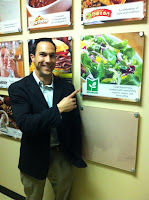The final day of our 10 day National Seminar began extra early as we traveled to Michigan State University in East Lancing. The home of the Spartans is about 90 miles west of Detroit.
Organic Farming and Urban Resource Training
Our first meeting was with Jeremy Moghtader the Director of the MSU Organic Farm and Urban Farming Resources Training Program. He showed us around the hoophouses and explained how they grow so many varieties of fruits and veggies even when temperatures drop below normal growing conditions. Class 42 found Mr. Moghtader's knowledge of organic farming and education to be realistic and practical. The work he and his team are doing to educate young people inspires the students, adding to the glimmer of hope to the revitalization of Detroit and it's problems surrounding food deserts.
 |
| Class 42 inside the Hoophouse |
Food Deserts in Eastern Michigan and the Future of Food in the United States
 |
| Class 42 at MSU Campus |
After a tour of the farm we met with Dr. Michael W. Hamm, the C.S. Mott Professor of Sustainable Agriculture with the Department of Community, Agriculture, Recreation and Resource Studies at MSU. Dr. Hamm shared his wealth of knowledge and research on Food Deserts -- the lack of access to healthy foods, including fruits and vegetables. His research helped the fellows of class of 42 bring the Detroit trip into full circle. All the stories and theories that we had heard in Detroit were being presented with actual data and forecasts.
Challenges in Detroit; Views from Standpoint of Program Planning and Policy Education
After lunch the Presiding Fellows exercised skills of agility and teamwork as venue changes and the addition of 3 new keynoters to the afternoon session kept them busy working on introductions and scheduling. AnnMarie Schneider, Director of Program Planning and Policy Education along with David Hollister and Amanda Avila of Prima Civitas and Jill Cords with MSU provided perspectives on culture change and moving ideas from the world of academia to market. We were also fortunate to meet Vicki Pontz of the Great Lakes Leadership Academy, a program with similar roots to the California Agricultural Leadership Program. Vicki worked closely with Dr. Crabb several months ago to help provide contacts and coordinate our successful experience in Michigan.
 |
| Ange at Gordon Foodservice |
The day didn't end here. The class got to enjoy a tour of Gordon Foodservice, a family owned independent broadline foodservice distributor that has been in business for over 100 years. This distribution facility left the fellows amazed at the level of technology and precision utilized to distribute to hotels, restaurants, schools and other customers throughout the surrounding areas in Michigan. We were also impressed by the mission, values, and vision statements displayed throughout the halls to remind everyone of the bigger picture in the day-to-day business activities









.jpg)

.JPG)





